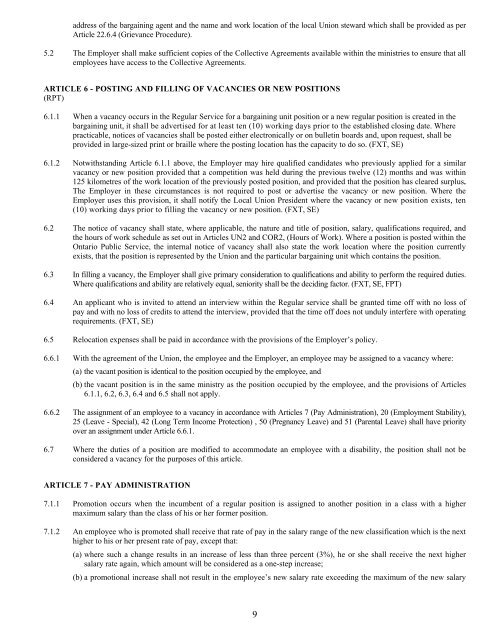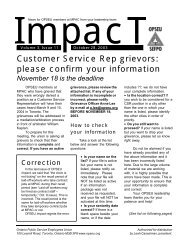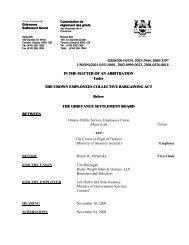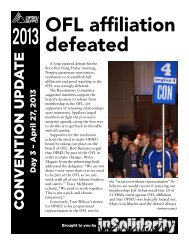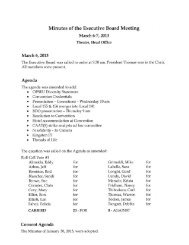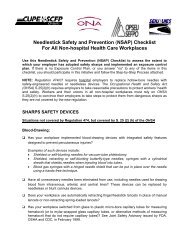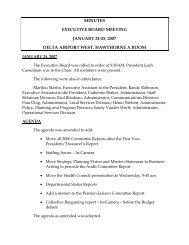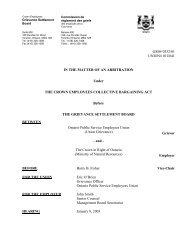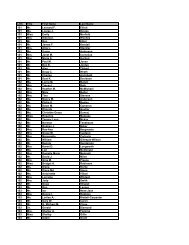COLLECTIVE AGREEMENTS - OPSEU
COLLECTIVE AGREEMENTS - OPSEU
COLLECTIVE AGREEMENTS - OPSEU
You also want an ePaper? Increase the reach of your titles
YUMPU automatically turns print PDFs into web optimized ePapers that Google loves.
address of the bargaining agent and the name and work location of the local Union steward which shall be provided as per<br />
Article 22.6.4 (Grievance Procedure).<br />
5.2 The Employer shall make sufficient copies of the Collective Agreements available within the ministries to ensure that all<br />
employees have access to the Collective Agreements.<br />
ARTICLE 6 - POSTING AND FILLING OF VACANCIES OR NEW POSITIONS<br />
(RPT)<br />
6.1.1 When a vacancy occurs in the Regular Service for a bargaining unit position or a new regular position is created in the<br />
bargaining unit, it shall be advertised for at least ten (10) working days prior to the established closing date. Where<br />
practicable, notices of vacancies shall be posted either electronically or on bulletin boards and, upon request, shall be<br />
provided in large-sized print or braille where the posting location has the capacity to do so. (FXT, SE)<br />
6.1.2 Notwithstanding Article 6.1.1 above, the Employer may hire qualified candidates who previously applied for a similar<br />
vacancy or new position provided that a competition was held during the previous twelve (12) months and was within<br />
125 kilometres of the work location of the previously posted position, and provided that the position has cleared surplus.<br />
The Employer in these circumstances is not required to post or advertise the vacancy or new position. Where the<br />
Employer uses this provision, it shall notify the Local Union President where the vacancy or new position exists, ten<br />
(10) working days prior to filling the vacancy or new position. (FXT, SE)<br />
6.2 The notice of vacancy shall state, where applicable, the nature and title of position, salary, qualifications required, and<br />
the hours of work schedule as set out in Articles UN2 and COR2, (Hours of Work). Where a position is posted within the<br />
Ontario Public Service, the internal notice of vacancy shall also state the work location where the position currently<br />
exists, that the position is represented by the Union and the particular bargaining unit which contains the position.<br />
6.3 In filling a vacancy, the Employer shall give primary consideration to qualifications and ability to perform the required duties.<br />
Where qualifications and ability are relatively equal, seniority shall be the deciding factor. (FXT, SE, FPT)<br />
6.4 An applicant who is invited to attend an interview within the Regular service shall be granted time off with no loss of<br />
pay and with no loss of credits to attend the interview, provided that the time off does not unduly interfere with operating<br />
requirements. (FXT, SE)<br />
6.5 Relocation expenses shall be paid in accordance with the provisions of the Employer’s policy.<br />
6.6.1 With the agreement of the Union, the employee and the Employer, an employee may be assigned to a vacancy where:<br />
(a) the vacant position is identical to the position occupied by the employee, and<br />
(b) the vacant position is in the same ministry as the position occupied by the employee, and the provisions of Articles<br />
6.1.1, 6.2, 6.3, 6.4 and 6.5 shall not apply.<br />
6.6.2 The assignment of an employee to a vacancy in accordance with Articles 7 (Pay Administration), 20 (Employment Stability),<br />
25 (Leave - Special), 42 (Long Term Income Protection) , 50 (Pregnancy Leave) and 51 (Parental Leave) shall have priority<br />
over an assignment under Article 6.6.1.<br />
6.7 Where the duties of a position are modified to accommodate an employee with a disability, the position shall not be<br />
considered a vacancy for the purposes of this article.<br />
ARTICLE 7 - PAY ADMINISTRATION<br />
7.1.1 Promotion occurs when the incumbent of a regular position is assigned to another position in a class with a higher<br />
maximum salary than the class of his or her former position.<br />
7.1.2 An employee who is promoted shall receive that rate of pay in the salary range of the new classification which is the next<br />
higher to his or her present rate of pay, except that:<br />
(a) where such a change results in an increase of less than three percent (3%), he or she shall receive the next higher<br />
salary rate again, which amount will be considered as a one-step increase;<br />
(b) a promotional increase shall not result in the employee’s new salary rate exceeding the maximum of the new salary<br />
9


